Delivering on Energy and the Environment
Air Date: Week of April 4, 2008
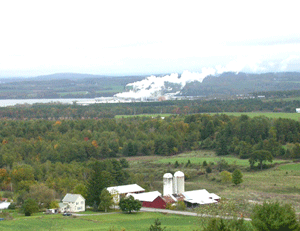
International Paper's test burn of waste tires drew protests from downwind residents but the project got support from Senator Clinton.(Photo: Glenn Estus)
Would Hillary Clinton have the political will to deliver on her ambitious plans for energy and the environment? Living on Earth's Jeff Young finds the answer depends on which part of the Clinton record you look at.
Transcript
[RETURN THEME]
GELLERMAN: From the Jennifer and Ted Stanley Studios in Somerville, Massachusetts, this is Living on Earth. I’m Bruce Gellerman, in for Steve Curwood.
Senator Hillary Clinton says she has big plans for tackling global warming and our addiction to fossil fuels. As part of our continuing coverage of green issues in the race for the White House, Living on Earth¹s Jeff Young investigates the Clinton record when it comes to taking on the energy industry.
YOUNG: Early in her run for president, Senator Hillary Clinton told labor and environmental leaders about a cornerstone of her energy plan. Oil companies were going to have to become cleaner energy companies.
CLINTON: Well, we have to tell the oil companies to play or pay. Either invest more of their windfall profits in alternative energy development, or pay into a strategic energy fund to get this country substantially off oil, and on to cleaner and more secure forms of energy.
YOUNG: Well, that went over well with the environmentalists. But about a year later, Clinton faced arguably the political battle of her life in a must-win primary race in Texas, a place where they’re rather fond of drilling oil. But Clinton campaign advisor Catherine Brown says Clinton did not back away from her big oil challenge.
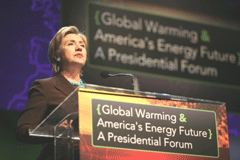
Senator Hillary Clinton at the Presidential Forum on Global Warming and America's Energy Future. Clinton said she'll force big oil companies to spend more on clean energy, even as she campaigned deep in the heart of oil-rich Texas.(Photo: Laura Kleinhenz)
YOUNG: Brown says that’s the gutsy leadership Clinton also showed on the Senate’s environment committee. She worked to lower diesel emissions, raise fuel economy, and fought against efforts to weaken environmental enforcement.
BROWN: I think Senator Clinton has an extremely long, strong record on environmental issues, and a very clear vision of where she wants to take our country.
YOUNG: But despite that record, grass roots activists in New England and Appalachia say Clinton took the wrong side in their energy and environment issues. First, New England: three years ago, International Paper’s mill in Ticonderoga, New York, wanted to lower its fuel costs by burning waste tires to fire its boilers. The mill is an important employer in upstate New York. But downwind in Middlebury, Vermont, Joanna Colwell wondered what burning tires might mean for her newborn child.
COLWELL: Almost every kind of pollutant that they can measure is increased, you know, from heavy metals to dioxin, and these are all -- have a very, very bad impact on children's developing brains.
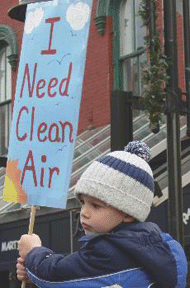
A boy protests the International Paper Company's tire burn in Ticonderoga in 2006.(Photo: Thomas Ford-Hutchinson, Courtesy of the Vermont Cynic)
COLWELL: I remember when I saw the letter that she wrote I just thought, ‘isn¹t this the woman who said “it takes a village to raise a child”?’
YOUNG: International Paper ran its test, but it was halted after just a few days because the pollution exceeded the company’s air permit. Brown, with the Clinton campaign, dismisses it all as a minor incident.
BROWN: This is a little silly. Senator Clinton supported a permit for a test. It was certainly not anything bigger than that.
COLWELL: They're testing on us! It's not okay; we are not guinea pigs. And it felt really cynical to me that she just wanted those votes in upstate New York.
YOUNG: In Appalachia, activists fighting damaging mining practices also say they see a gap between Clinton’s rhetoric and record. Here was Clinton in a speech to environmentalists last year:
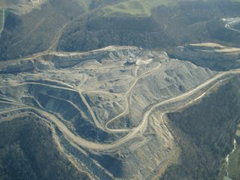
Senator Clinton said she won’t take a position on mountaintop removal mining because of "the conflict between economic and environmental tradeoffs."(Photo: Jeff Young)
YOUNG: But that’s not quite the message Senator Clinton had when she traveled to coal country last month. West Virginia Public Radio asked Clinton about mountaintop removal -- the mining practice that flattens hilltops and dumps waste in streams.
CLINTON: I think it’s a difficult question because of the conflict between the economic and environmental tradeoffs that you have here.
YOUNG: Clinton said she has no position on mountaintop removal. She emphasized her support for the continued use of coal, and said the government should help pay for technology to capture coal’s greenhouse gases and convert coal to a liquid fuel for transportation.
CLINTON: It's imperative that we do everything we can to get to a technology that enables us to use clean coal that supports the subsidies for coal to liquids projects that meet that environmental standard that I think we can set.
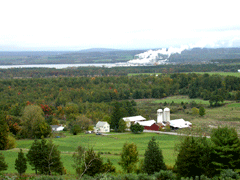
International Paper's test burn of waste tires drew protests from downwind residents but the project got support from Senator Clinton.(Photo: Glenn Estus)
HITT: Well, Senator Clinton's intelligence, her experience, her track record would certainly indicate that she has all the qualities that it would take to stand up to big, powerful energy interests. However, her actions on the ground so far in West Virginia and Kentucky have not been as promising, and it definitely calls into question whether or not she would really be willing to stand up to those industries if she was the next president of the United States.
YOUNG: Campaign advisor Brown says Clinton is taking a realistic view of an important energy source.
BROWN: You know, she understands the challenge that we face with coal, but coal right now represents half of our energy mix, and Senator Clinton isn’t under the illusion that in one day we can move to fueling our economy entirely through alternative and renewable fuels.
YOUNG: Brown says look at the big picture, and you see a senator who’s earned a 90 percent positive rating from the League of Conservation Voters. Residents like Colwell and Hitt say look at the details and you see someone who chose political convenience over principle. Either way you see it, it reflects something Clinton has often said during this campaign: that she may be the most famous person you don’t really know. For Living on Earth, I’m Jeff Young in Washington.
Links
League of Conservation Voters scorecard on Senator Clinton
Read the letter Senator Clinton wrote supporting the International Paper test tire burn
Check our Living on Earth's coverage of Barack Obama's environmental record here
Living on Earth explores the environment and the presidential elections in "A Greener White House?”
Learn more about mountaintop removal mining from Living on Earth's previous coverage
Living on Earth wants to hear from you!
Living on Earth
62 Calef Highway, Suite 212
Lee, NH 03861
Telephone: 617-287-4121
E-mail: comments@loe.org
Newsletter [Click here]
Donate to Living on Earth!
Living on Earth is an independent media program and relies entirely on contributions from listeners and institutions supporting public service. Please donate now to preserve an independent environmental voice.
NewsletterLiving on Earth offers a weekly delivery of the show's rundown to your mailbox. Sign up for our newsletter today!
 Sailors For The Sea: Be the change you want to sea.
Sailors For The Sea: Be the change you want to sea.
 The Grantham Foundation for the Protection of the Environment: Committed to protecting and improving the health of the global environment.
The Grantham Foundation for the Protection of the Environment: Committed to protecting and improving the health of the global environment.
 Contribute to Living on Earth and receive, as our gift to you, an archival print of one of Mark Seth Lender's extraordinary wildlife photographs. Follow the link to see Mark's current collection of photographs.
Contribute to Living on Earth and receive, as our gift to you, an archival print of one of Mark Seth Lender's extraordinary wildlife photographs. Follow the link to see Mark's current collection of photographs.
 Buy a signed copy of Mark Seth Lender's book Smeagull the Seagull & support Living on Earth
Buy a signed copy of Mark Seth Lender's book Smeagull the Seagull & support Living on Earth

